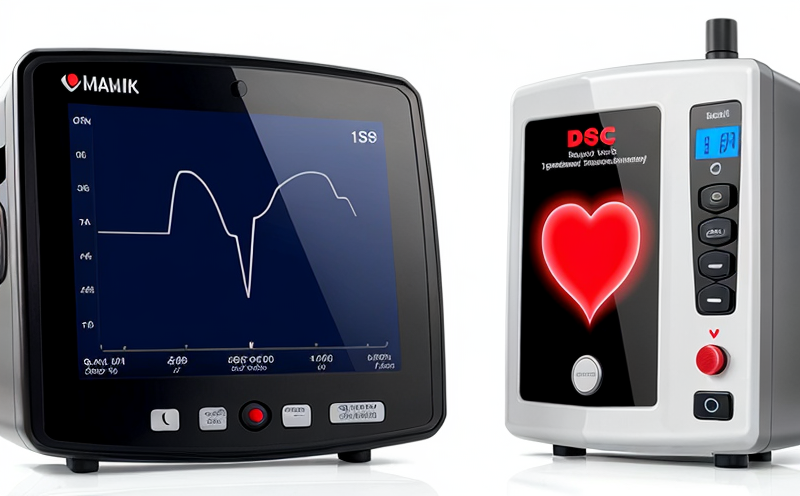ISO 25539-2 Stent Crush Resistance Testing
The ISO 25539-2 standard is a critical component of ensuring the safety and efficacy of cardiovascular stents in medical devices. This test evaluates how well a coronary stent withstands crushing forces, which can occur during deployment or under certain clinical conditions.
Crush resistance testing is essential because it ensures that the stent will not collapse or deform under expected mechanical stresses. The standard applies to both self-expandable and balloon expandable coronary stents. During the test, a stent sample is subjected to a specified crushing force for a defined period, after which its dimensional stability is assessed.
The testing procedure involves several key steps:
- Sample Preparation: The stent is cleaned and prepared according to the standard. This includes ensuring that the stent is free from any contaminants or residues that could affect test results.
- Instrumentation Setup: A specialized testing machine applies a defined crushing force to the stent sample, typically ranging from 20 kN up to 40 kN. The force is applied uniformly across the entire length of the stent.
- Data Collection: Throughout the test, the machine continuously records the dimensional changes of the stent under compressive load. This data helps in determining whether the stent maintains its original shape and integrity after crush loading.
- Evaluation Criteria: The stent is considered to have passed the test if it demonstrates a specific degree of deformation or failure within specified limits outlined by ISO 25539-2. Compliance with these criteria ensures that the device can withstand the stresses encountered during real-world use without compromising patient safety.
The results of this testing are crucial for quality assurance and regulatory compliance, especially when seeking FDA approval or CE marking. Successful completion of crush resistance tests provides evidence that the stent is robust enough to perform reliably under anticipated conditions, thereby safeguarding patients from potential complications such as stent collapse or migration.
At Eurolab, we utilize state-of-the-art equipment and follow stringent protocols to ensure accurate and reliable test results. Our comprehensive approach ensures that every step of the process adheres strictly to ISO 25539-2 guidelines, providing you with confidence in your product's performance.
Our team of experts can guide you through the entire testing process, from initial consultation to final report delivery. We understand the importance of this test for your cardiovascular device and are committed to delivering high-quality results that meet or exceed industry standards.
Why It Matters
The ISO 25539-2 crush resistance test is essential in the medical device industry because it directly impacts patient safety and efficacy. When a stent is implanted, it must maintain its integrity and function properly under various mechanical stresses. Crush resistance testing ensures that the stent can withstand the forces it may encounter during deployment or subsequent use.
Crush resistance failures are particularly dangerous in cardiovascular devices as they could lead to complications such as blockages or migration of the stent, which could require additional medical interventions or surgery. By ensuring that a stent passes this test, manufacturers can have confidence that their product will perform reliably under anticipated conditions.
From a regulatory standpoint, compliance with ISO 25539-2 is mandatory for many markets, including the United States and Europe. This ensures that devices meet rigorous quality standards before they are brought to market. Compliance also helps mitigate potential risks associated with substandard products, protecting both patients and manufacturers from liability issues.
Additionally, successful completion of this test can significantly enhance your brand's reputation in the medical device industry. Demonstrating adherence to stringent international standards not only assures regulatory bodies but also builds trust among healthcare providers and patients who rely on these devices for critical treatments.
Eurolab Advantages
At Eurolab, we pride ourselves on offering unparalleled expertise in medical device testing. Our team of highly skilled professionals leverages cutting-edge technology and years of experience to provide accurate, reliable, and compliant ISO 25539-2 crush resistance tests for your cardiovascular devices.
We understand the critical nature of this test and are committed to delivering results that meet or exceed industry expectations. Our state-of-the-art facilities and advanced instrumentation allow us to conduct precise and repeatable tests under controlled conditions, ensuring consistent accuracy across all samples.
Our comprehensive approach extends beyond just conducting the test; we also offer expert guidance throughout the entire process. From initial consultation with your R&D engineers to providing detailed reports upon completion, our goal is to streamline your testing efforts while maintaining the highest standards of quality and reliability.
We are equipped to handle a wide range of stent types, including different materials, designs, and sizes, ensuring that we can cater to all your testing needs. Our commitment to excellence ensures that you receive timely, accurate results that contribute positively to your product development process.
Environmental and Sustainability Contributions
Incorporating ISO 25539-2 crush resistance testing into the manufacturing process of cardiovascular devices not only enhances patient safety but also supports environmental sustainability efforts. By ensuring that stents are robust enough to perform reliably under anticipated conditions, manufacturers can reduce waste associated with failed products and minimize the need for additional interventions or replacements.
Through rigorous testing, we help prevent substandard products from reaching the market, which could lead to increased healthcare costs and resource depletion. By promoting high-quality devices that function effectively over longer periods, our services contribute positively towards reducing environmental impact while simultaneously improving patient outcomes.
We strive to minimize waste by optimizing test procedures and utilizing advanced technologies that enhance efficiency without compromising accuracy. This commitment aligns with broader sustainability goals within the medical device industry, fostering a more responsible approach to product development and manufacturing.





